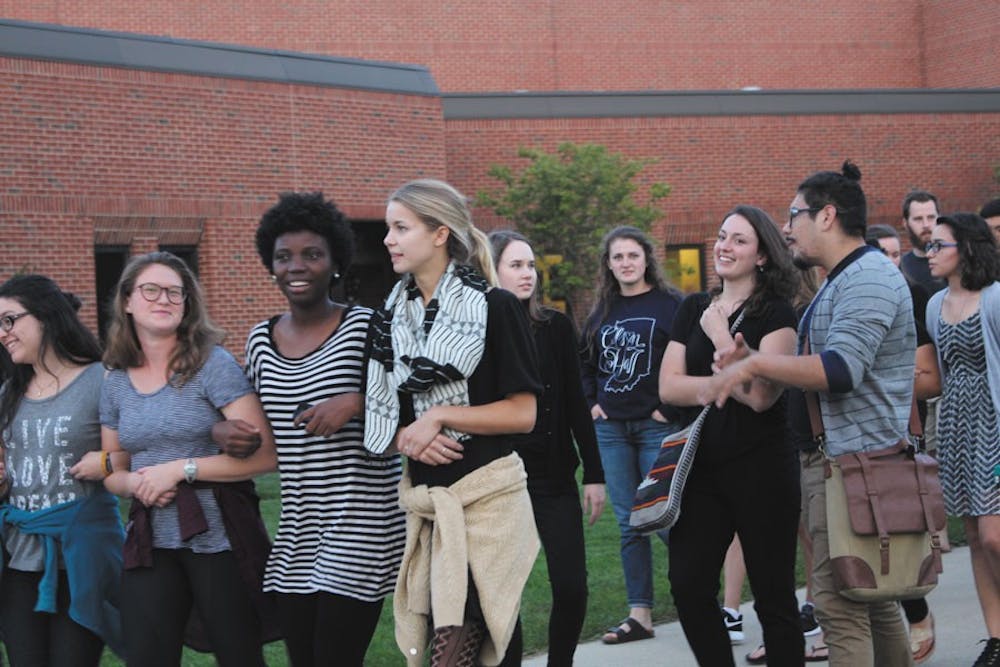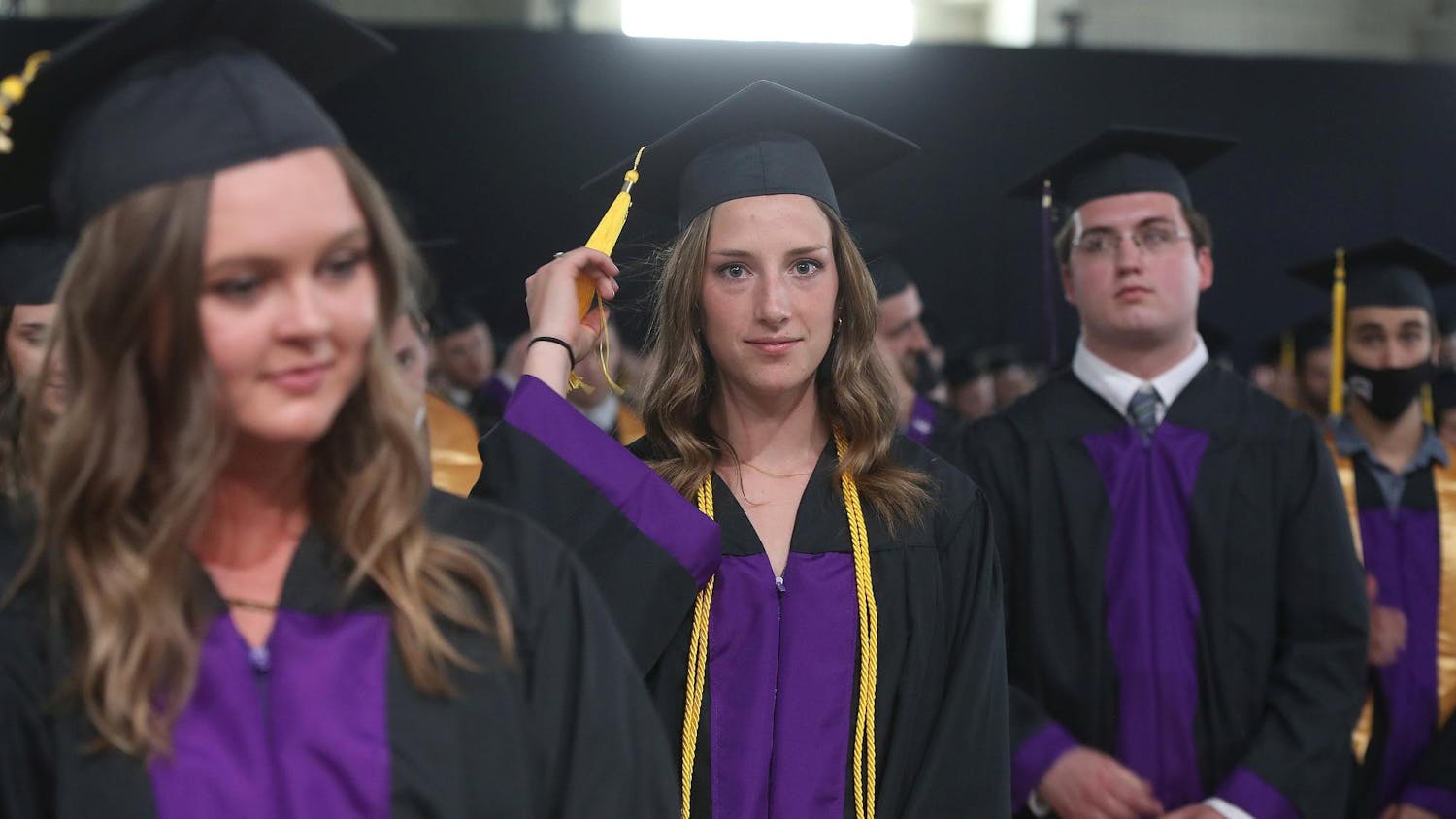By Cassidy Grom | Echo
On campus
"I never noticed that I was actually black until I came to school," senior Leslie Romer said.
Romer grew up in the Bahamas. The first semester of his freshman year at Taylor, his professor, who is black, came in crying. According to Romer, the professor had received an offensive image and a threat of arson and death for her and her husband. That was Romer's first introduction to American racial relations.
According to Romer, since then, he has been forced to confront various stereotypes. He said someone once came up to him on campus and asked him if he knew where to buy drugs: "I said, 'Why do you feel like I know where someone sells drugs?' No answer. And I was like, 'It's because I'm black, right?' And then he walked off."
Romer believes Taylor students have a herd mentality: if you think a different way than the majority, then you are wrong.
When he talks about racial issues, Romer said he feels like people think he is complaining. He becomes frustrated when people don't believe him and this tension he experiences has caused him to distance himself from the Taylor community.
"I am getting to the point where I really don't want to deal with people," Romer said. "If you feel like I am complaining, I really don't want you around me."
Senior Sharee Nurse, a black student, defined racism as the majority using their power over minorities. Nurse is the president of the Black Student Union. She said cases of direct racism aren't as common in her experience but racism still occurs through microaggressions. According to Nurse, microaggressions can occur when professors refer to students of color as "other" and white students as "normal" or "regular" students. While on Taylor's campus, Nurse was told she was "too white to be black."
According to Nurse, those microaggressions occur often. Last week, she had a different student talk to her about varying incidents involving some type of racism every day.
"People look at racism and expect it to feel like someone is stabbing you in the gut with a knife," she said. "But (racism) is like those subtle blows that just keep going and going and after a while it starts to hurt-starts to bruise-to wear you down."
Junior Ariel Lee, vice president of the Black Student Union, said students typically don't talk about issues of race in their residence halls. She thinks this is because students in residence halls are focused on fostering a sense of unity or belonging. Yet, Lee, a black student, says talking about differences does not create separation. Those conversations instead foster awareness and empathy for people of color.
When Lee was a freshman three years ago, she noticed students of color rarely held cabinet positions in organizations across campus. So, instead of immediately joining BSU, she became involved with Women's Programming (WoPro). She said being a representative of minority students is important because it challenges organizations to hear diverse voices and opinions.
Others disagree. Sophomore Tom Metzger, a white student, said, "Why should it matter what population of your college is black; why should it matter what percentage of your company is black or white or asian. . . I don't look at people and see race. But now I'm being told that this colorblind view of the world is, in fact, racist. I don't understand that. I don't see how completely eliminating race is racist."
Off campus
The discomfort doesn't stop when Taylor students leave campus. Some students of color said they feel unsafe when they go out into surrounding communities. Lee said she worries more if she is riding in a car with black or latino friends than with a group of white friends. According to Lee, black children get "the talk" about how they are perceived and how to act in public. She also said it doesn't help that Indiana is a state known for being unkind to people of color.
"I feel really uncomfortable going (off campus) by myself," Nurse said. "Sometimes you get looks from people that do not shout out, 'I want to be friends!'"
On Oct. 1, a Taylor staff member was in line at the post office where he was trying to mail some boxes overseas. According to an Oct. 2 Facebook post from Kevin Diller, associate professor of philosophy and religion, a white man in the post office line was frustrated at the wait and started yelling obscenities at the Taylor staff member.
Four weeks ago, Romer attended an accounting job fair in Indianapolis. In his first interview, he felt like the RSM human resource (HR) manager for Indianapolis was racially profiling him. According to Romer, the HR manager nervously tapped her hand, did not make eye contact and asked Romer if he could afford winter jackets. At the end of the interview, Romer said she didn't want to shake his hand.
Romer was angry and left the job fair early. "I couldn't focus," he said. "And because I was angry, I didn't want to misplace my anger toward anyone else. So I just left. I missed three other job interviews because I couldn't focus."
The RSMIndianapolis HR manager did not return The Echo's phone calls.
Black Lives Matter / Blue Lives Matter signs
"Blue Lives Matter . . . These men were murdered because of the hate that Black Lives Matter spreads and the lies they tell."
On Sept. 28, sophomore Tom Metzger wrote these words on a whiteboard along with a list of eight police officers recently shot. Metzger said the sign he wrote was in response to another sign outside the Office of Intercultural Programs (OIP) office that encouraged students to remember the names of dead black men. Metzger said it took him about two hours to research, compile the names of the police officers and write the sign.
According to Metzger, although the police officers were innocent and killed while protecting their communities, their names have faded into obscurity.
Lee saw Metzger's sign and felt strong emotions: "At first it was shock, then anger and then sadness," she said. Lee felt Metzger hadn't considered the emotional impact of the words he wrote on the sign: "We advertise this dream community, but then we see things like that. For us, that breaks what community looks like."
Lee said the OIP office was a place that she wanted to feel safe. "Man, it is not home anywhere, unless you are around all the people that look like you. It was sad. It was crazy too-having to go to class after that and be like, 'Okay, now I have to focus on work.'"
Nurse said the sign made her feel frustrated, especially the parts about Black Lives Matter spreading hate and telling lies. But in a way, the sign was eye-opening for some students.
"(This student) is not the only person on Taylor's campus who feels that way," Nurse said. "He is just the first person to be bold enough to say something. Which, in that sense, I am glad he did because it kind of lets us know that clearly this conversation is not over."
Shortly after Metzger wrote the sign, an administrator asked him to take it down. Metzger doesn't own the white board he wrote on and isn't a part of a club allowed to publicize on campus. Metzger said he was illuminating the Blue Lives Matter side and arguing that most of the black men whose names were posted were engaged in some form of criminal activity at the time of their death. "They weren't fully innocent as you're trying to suggest," Metzger said.
Prayer walk
The following week, senior Hannah Schaefer organized a prayer walk to engage Taylor community members in praying for racial reconciliation and repentance from the sin of racism on campus.
On the nights of Oct. 4, 5 and 6, a group of between 40 and 60 students gathered outside of Rupp, linked arms and walked one lap around the campus loop. The students took turns praying aloud.
Schaefer said it was awkward for some students-linking arms with a stranger and walking as a crowd around the campus-but it was an awkward she was okay with. She planned the event mainly for "white moderates." This term borrowed from Martin Luther King Jr. describes white people who care about racial issues but rarely display those views in public.
Metzger agrees that race relations have been hurt, but he said reconciliation is not necessary. "Everything's good," Metzger said. "You weren't a slave. I wasn't slave owner. You weren't a slave owner. I wasn't a slave . . . It's a done deal."
Later, Metzger said race relations is something worth praying for, but just praying won't solve anything; people have to actively work to solve it.
Woke Week
This week, the Black Student Union (BSU) hosted Woke Week. It was comprised of three events, including public discussions and a movie that discussed race.
According to Nurse, "woke" is a term commonly used by people of color to describe being aware of racial tensions and social injustices.
Nursesaid the events were designed to clear up misconceptions about the Black Lives Matter movement. Major misconceptions about Black Lives Matter are that it is anti-white, anti-police or a hate group, according to Nurse.
"There have been several people, who can remain unnamed, who have asked us (to) not do Woke Week because it is not a good time or it makes them uncomfortable," Nurse said. "They don't want to do anything controversial and don't want to make any of the alumni upset . . . Caring for other people and a lot of times breaking the status quo is a lot of times what Jesus did and what he said to people was uncomfortable. And it didn't always feel good. If we are going to be a body of believers then we have to step out of our comfort zones-regardless of whether it is homecoming weekend."
Community members' suggestions
Schaefer describes Taylor's collective disposition toward conversations of race as a tentative curiosity. "I think most students on campus are becoming aware that talking about race is (a) conversation that needs to be had," she said. "I think what is key now is how we talk about race-giving the people the tools and space to ask good questions."
Students think there are various ways to gain those tools. Romer said he is taking a class on racial issues next semester and wants others to join him. In a letter to the Taylor community about the Upland post office incident, President Lowell Haines encouraged the Taylor community to pray, impact the world for Christ and stand in solidarity with minorities who are threatened.
Metzger suggested a different approach: "The best way to solve this whole issue and make it go away just like that, in the words of Morgan Freeman, would be: 'Stop talking about it.' Stop factoring in race."
Lee wants white students to let go of white guilt, the guilt that comes from other white people harming minorities, whether currently or historically. Lee said once students push past their white guilt, they become strong allies and advocates for minorities.





